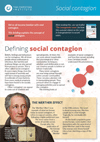
Social contagion
We’ve all become familiar with viral contagion. This briefing explains the concept of social contagion.

Sweden has restricted the use of cross-sex hormones and mastectomies being performed on children.
A year ago, it limited the use of sex-swap hormones to very rare cases. In December, its health board restricted surgeries on teenage girls to research settings.
The National Board of Health and Welfare said: “The uncertain state of knowledge calls for caution.”
In 1972, Sweden became the first country to introduce legal gender reassignment.
It has seen a sharp rise in cases of gender dysphoria in recent years, particularly among teenage girls with a 1,500 per cent increase since 2008.
The Chief Physician at Sahlgrenska University Hospital in Gothenburg, Mikael Landen, denied that the sudden increase is a result of society’s acceptance, arguing “tolerance has been high in Sweden for at least the last 25 years, so you can’t say it has changed”.
According to Finland’s leading transgender expert, there is overwhelming evidence for the link between exposure to social media and the desire for gender transitions among female teenagers.
She also said ‘gender-affirming treatments’ administered in the US, including social transition, were likely to solidify patients’ problems instead of treating them.
Dr Kaltiala also said it is not “justified to tell the parents of young people identifying as transgender that a young person is at risk of suicide without medical treatments and that the danger can be alleviated with gender reassignment”.

We’ve all become familiar with viral contagion. This briefing explains the concept of social contagion.
Her research in 2019 found that there was not enough data on “adolescent onset gender dysphoria” to justify body-altering treatments.
An evident lack of research on adolescent onset gender dysphoria led to reviews of national programmes by health officials in Finland, Sweden and the United Kingdom.
Referrals to gender identity services in the UK rose from under 250 in 2011-12 to over 3,500 in 2021-22.
Of those referred in 2021-22, half the children were aged 15 and under, fifteen of which were below the age of four.
A statement by NHS England noted “scarce and inconclusive evidence” for making decisions which may have “life-long consequences”.
In 2022, the Cass Review submitted its interim report to NHS England on clinical practice at the Tavistock and Portman NHS Foundation Trust’s Gender Identity Development Service (GIDS).
Based on its findings, the report concluded that GIDS’ clinical approach was not fit for purpose.
‘We’re inflicting permanent harm on children’, says trans clinic whistleblower
Tavistock exposé: ‘A definitive record of what happened’
Aus parents battle to protect kids from trans ideology in face of prosecution threats